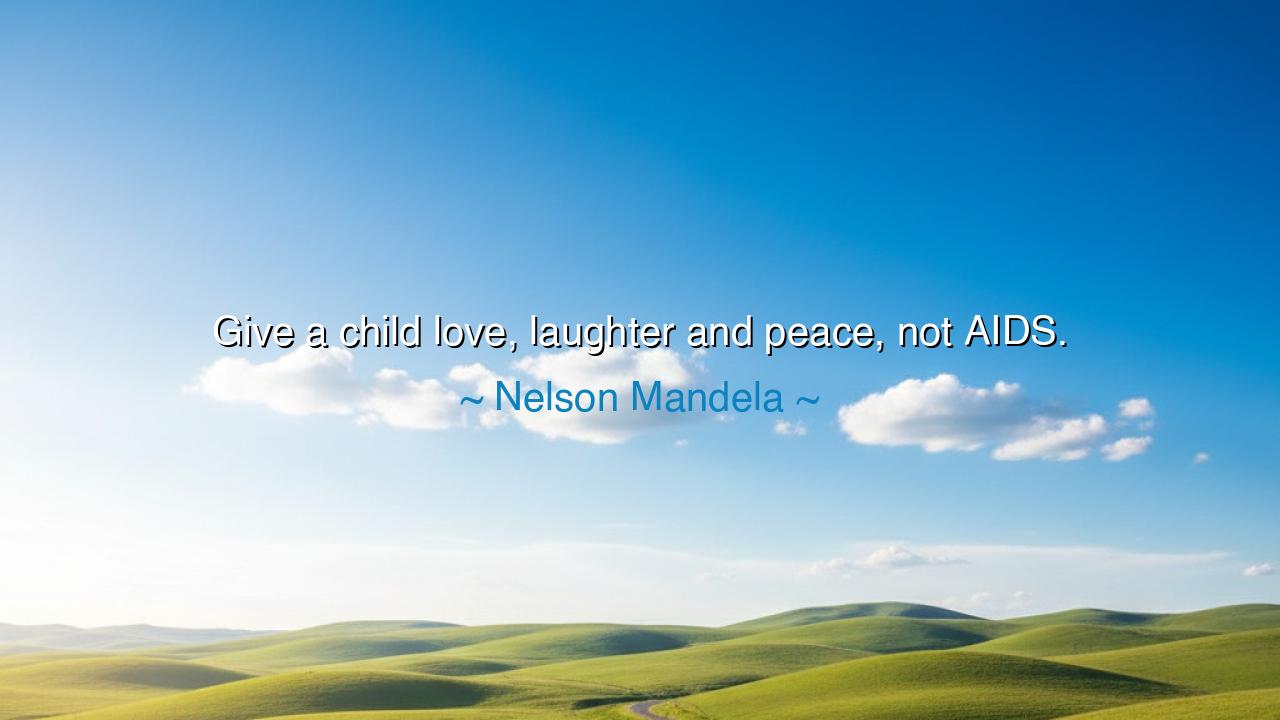
Give a child love, laughter and peace, not AIDS.






Hear the tender yet powerful words of the liberator, Nelson Mandela, who proclaimed: “Give a child love, laughter and peace, not AIDS.” These words are both a cry of sorrow and a command of hope. They come from a time when the HIV/AIDS epidemic ravaged South Africa and much of the world, when countless children were left orphaned or infected through no fault of their own. Mandela, who had known the chains of prison and the burden of injustice, now turned his voice to defend the most vulnerable of all—children, whose only inheritance should be joy, not suffering.
In saying, “Give a child love,” Mandela revealed the first and greatest gift. For without love, no child can grow whole. Love nurtures the spirit, builds confidence, and teaches dignity. In his own life, Mandela saw how the absence of love—whether through poverty, violence, or oppression—left deep scars on the young. Thus he called upon families, communities, and nations to ensure that every child is embraced with affection, protected by care, and raised with compassion.
To give a child laughter is to protect their innocence. Laughter is the language of childhood, the melody of joy unburdened by fear. Yet in the days of the epidemic, many children lost this gift too soon, their lives shadowed by grief and disease. Mandela’s words remind us that laughter is not frivolous—it is life-giving, a sign that the spirit is free. A world that robs a child of laughter is a world that has failed in its duty.
And to give a child peace is to promise them a world free from violence, fear, and despair. Mandela, who had fought for peace among nations, now pleaded for peace in the hearts of the young. For what is peace, if not the soil in which love and laughter can grow? Without peace, children inherit war, poverty, and disease. But with peace, they inherit the chance to flourish, to dream, and to become the builders of a better tomorrow.
The final part of the quote, “not AIDS,” strikes like a thunderbolt. Here Mandela confronted the harsh reality of his time: an epidemic that stole millions of lives and struck hardest among the poor and the innocent. His call was both moral and practical—that society must work tirelessly to prevent the spread of the disease, to provide treatment, to end stigma, and above all to ensure that children are not condemned to suffering when they should be receiving the gifts of joy. It was a call to action, for leaders and common people alike, to fight not with weapons, but with compassion, education, and healing.
History offers its proof. When Jonas Salk developed the polio vaccine, he gave to the children of the world not disease, but health. Entire generations were spared paralysis and death because one man’s vision and humanity prevailed. In the same way, Mandela’s words remind us that humanity must unite its resources and willpower to ensure that children inherit not the curses of their age, but the blessings of progress and love.
O children of tomorrow, let this teaching live in you: the measure of a society is found in how it treats its children. Give them love, for it will shape their souls. Give them laughter, for it will keep their spirits alive. Give them peace, for it will secure their future. And guard them from suffering, whether from disease, neglect, or violence. In your own life, support the weak, protect the young, and build a world where innocence is preserved.
Thus, the words of Nelson Mandela endure as a covenant: children must inherit joy, not sorrow; health, not affliction; hope, not despair. To give them love, laughter, and peace is to give them the foundation of life itself. To give them AIDS is to betray humanity’s duty. Therefore, let us labor, each in our own way, to fulfill this sacred charge, that the generations to come may bless us for the world we left in their hands.






TLThuy Linh
Nelson Mandela’s statement calls attention to one of the greatest tragedies of our time: children suffering from AIDS. It’s a reminder that the lives of the youngest and most innocent shouldn’t be overshadowed by such a devastating disease. But I wonder, what more can be done at the global level to not only prevent the spread of HIV/AIDS but also to address the mental health aspects for children affected by it? Shouldn't we prioritize comprehensive support for both the child and their community?
TDtoan dao
Mandela’s words hit hard when considering how many children are affected by AIDS worldwide. The simple wish for love, laughter, and peace seems like such a basic right for children, yet it’s something that many are denied due to circumstances beyond their control. How do we address this disparity and fight the stigma surrounding HIV/AIDS? Could we do more to make prevention, care, and education more accessible to the most vulnerable populations?
VLViet Le
This quote brings to light the deep responsibility we have as adults in shaping the futures of children. While it’s impossible to completely shield children from the harsh realities of the world, Mandela’s words speak to the need to prioritize their well-being above all else. The mention of AIDS is particularly striking—are we doing enough to protect vulnerable children from HIV exposure? How can we advocate more for prevention and education in affected communities?
Ddieppham
Nelson Mandela’s words are so poignant. It’s heartbreaking to think that children could be born into a world where they face not only poverty or violence but also the weight of a disease they didn’t ask for. This quote emphasizes the importance of nurturing children with love, joy, and care, rather than exposing them to the devastation of AIDS. But how can we ensure that children grow up in such environments, especially in areas heavily affected by HIV/AIDS?